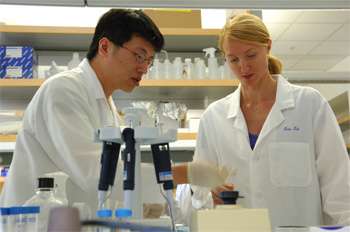Research
Find your care
We offer comprehensive eating disorder treatment programs. To learn more about our services, call 310-825-2631.
The UCLA Eating Disorders Program has been actively involved in research on anorexia nervosa and bulimia nervosa for more than 40 years.
The goal of this work has been to identify emotional, psychological and genetic factors that increase a person's risk for developing these conditions, and to determine what aspects of the treatment experience predict long-term successes in adjustment. For over 10 years, our center has been part of an international collaboration of scientists in North America and Europe seeking to identify genes that may be associated with eating disorders, and in identifying traits of personality that may increases susceptibility to eating disorders. The ultimate goal of this work is to use this information to shape new, more effective avenues of treatment.

Research papers published by Michael Strober PhD and his colleagues have described:
- The long-term course and outcome of anorexia nervosa (International Journal of Eating Disorders, 1997)
- Familial aspects of anorexia and bulimia nervosa (American Journal of Psychiatry, 2000)
- Possible candidate genes for anorexia nervosa (Molecular Psychiatry, 2003)
- A possible susceptibility gene for anorexia nervosa on chromosome 1 (American Journal of Human Genetics, 2002)
- A possible gene associated with bulimia nervosa on chromosome 10 (American Journal of Human Genetics, 2003)
- Personality characteristics in eating disorders before and after recovery (Psychological Medicine, 2005)
- The future of treatment research in anorexia nervosa (International Journal of Eating Disorders, 2005)
- Gender differences in anorexia nervosa (International Journal of Eating Disorders, 2006)
- Features associated with excessive exercise in eating disorders (International Journal of Eating Disorders, 2006)
See a detailed list of Dr. Strober's awards and publications (PDF)